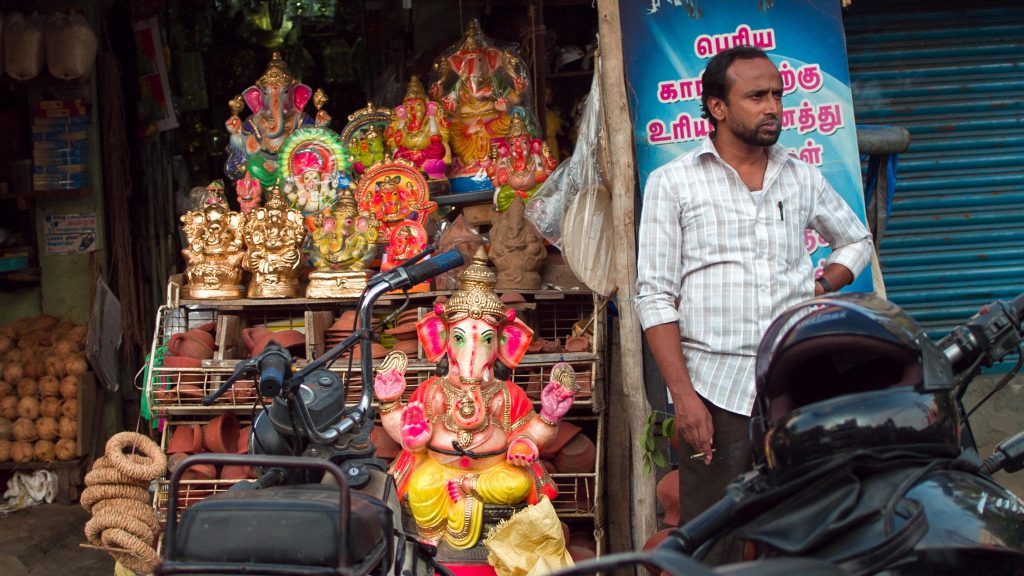Nasir, a Tamil film directed by Arun Karthick, is one of the finest Indian films seen in recent years. A seemingly simple, ‘observation’ film looking at a day in the life of its protagonist, Nasir (Koumarane Valavane), it is anything but so. Nasir is multi-layered, packs in a lot, pays every bit of attention to the tiniest of details and ultimately becomes a scathing comment on the times we live in. Based on a short story, A Clerk’s Tale by Dilip Kumar, Nasir plays out against the riots that took place attacking the Muslim community in the city of Coimbatore in Tamil Nadu in September, 2016. This was following the murder of the district spokesperson, C Sasikumar, of the Hindu Munnani group, an organization whose aims include, among other things, to protect Hindu rights and interests.
On the surface, Nasir austurely shows us the ordinary life of an ordinary man. A salesman in a sari and garment shop, Nasir lives with a mother battling cancer, a mentally challenged adopted son, Iqbal, and his wife, Taj (Sudha Ranganathan), the love of his life. Life, for him, is a daily struggle just to survive but he lives on with the small hope that, hopefully one day, things will get better. Through Nasir’s character, Karthick creates a rich and compelling humane portrait that explores most preceptively what it means to be a Muslim in present-day India. His empathy for Nasir comes through strongly in the film and this makes us invest heavily in Nasir’s character as well.
Nasir surely but quietly examines the role of religion and politics around us and the hatred, bigotry and senseless violence that arises with their misuse for power. It is something that can consume any of us at anytime even if we choose to stay away from it all. This is what makes the film all the more disturbing. That the personal, religious and the political worlds around us can collide anytime, anywhere with frightful consequences, especially for those considered the poor and helpless ‘other’.
Mostly, it’s with the little and not so obvious details that Nasir succeeds in getting its point across. That is what makes the film so cinematic as against the preachy ‘message’ films we see generally. We observe this as when Nasir walks though the gullies of his area and through the streets of Coimbatore to his place of work, there are often religious pandals in the background with provocative religious announcements from either side. It shows us how omnipresent religion and divisivity is around us today. And sometimes it just seeps into our subconscious without us even realizing it. Nasir’s colleagues, while perfectly amiable with him, nevertheless call him Bhai, something that is specifically used for addressing Muslims.
Koumarane Valavane, it has to be said, lives the role of Nasir. A big, big part of the film’s success is due to his central act. A theatre performer, that he faced the camera for the first time, makes his performance all the more credible. Sudha Ranganathan, too, makes a major impact as Nasir’s wife. The film has some lovely little personal moments concerning the two like when Nasir helps pin up his wife’s hijab with a safety pin or the little awkward yet intimate kiss they share in the morning. While the performances of the supporting cast are fine, some of the actors, though perfectly cast, do expose their rawness every now and then, as some of their reactions and their dialogue delivery appear rather stilted. Nasir character’s is also unable to escape some degree of stereotyping – that of the Muslim who has to be a poet and who listens to ghazals. Looking at the situation of the country post 2014 with the rise of Hindu Nationalism and the milieu the film is set in, we kind of predict the horrific end much earlier, and especially so, when we are told that riots have broken out in a part of the city. It’s a credit to the film’s power that it still hits us hard in the solar plexus when it finally happens.
The editing by the late Arghya Basu, to whom the film is dedicated, perfectly captures the gentle, unhurried rhythm and the little pleasures and disappointments of Nasir’s everyday life. The textured camerawork (the film is beautifully filmed by Saumyananda Sahi in real locales in the 4:3 format) and the evocative sound design by Gautam Nair, who also did sync sound for the film, more than do their bit in effectively creating Nasir’s little world around him.
All in all, Nasir is a highly relevant and important film of our time that haunts you long after it’s over. Looking at the direction the country has taken today, one perfectly understands the filmmaker’s sentiments when he laments in an interview, “I don’t want to feel happy that the film is so relevant. It is something to be ashamed of.” It is indeed so.
Tamil, Drama, Color


